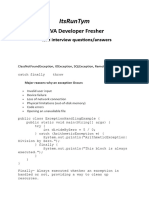Parameter Passing Mechanisms and This in Java
Uploaded by
ashoku2Parameter Passing Mechanisms and This in Java
Uploaded by
ashoku2Parameter Passing Mechanisms and this Keyword in Java
/* An Incorrect Attempt to Write a swap( ) Method to Swap Values
of Two Primitive Types in Java */
// BadSwapTest.java
public class BadSwapTest {
public static void swap(int x, int y) {
System.out.println("#2: x = " + x + ", y = " + y);
int temp = x;
x = y;
y = temp;
System.out.println("#3: x = " + x
}
public static void main(String[] args)
int a = 19;
int b = 37;
System.out.println("#1: a = " + a
// Call the swap() method to swap
BadSwapTest.swap(a, b);
System.out.println("#4: a = " + a
}
}
/*
#1:
#2:
#3:
#4:
*/
a
x
x
a
=
=
=
=
19,
19,
37,
19,
b
y
y
b
=
=
=
=
+ ", y = " + y);
{
+ ", b = " + b);
values of a and b
+ ", b = " + b);
37
37
19
37
/* An Example of Pass by Constant Value
*/
// PassByConstantValueTest.java
public class PassByConstantValueTest {
// x uses pass by constant value and y uses pass by value
public static void test(final int x, int y) {
System.out.println("#2: x = " + x + ", y = " + y);
/* Uncommenting following statement will generate a compiler error */
// x = 79; /* Cannot change x. It is passed by constant value */
y = 223; // Ok to change y
System.out.println("#3: x = " + x + ", y = " + y);
}
public static void main(String[] args) {
int a = 19;
int b = 37;
System.out.println("#1: a = " + a + ", b = " + b);
PassByConstantValueTest.test(a, b);
System.out.println("#4: a = " + a + ", b = " + b);
}
}
/*
#1: a = 19, b = 37
#2: x = 19, y = 37
#3: x = 19, y = 223
#4: a = 19, b = 37
*/
/* An Example of a Pass by Reference Value
*/
// PassByReferenceValueTest.java
public class PassByReferenceValueTest {
public static void main(String[] args) {
// Create a Car object and assign its reference to myCar
Car myCar = new Car();
// Change model, year and price of Car object using myCar
myCar.model = "Civic LX";
myCar.year = 1999;
myCar.price = 16000.0;
System.out.println("#1: model = " + myCar.model +
1
Parameter Passing Mechanisms and this Keyword in Java
", year = "
+ myCar.year +
", price = "
+ myCar.price);
PassByReferenceValueTest.test(myCar);
System.out.println("#4: model = " + myCar.model +
", year = "
+ myCar.year +
", price = "
+ myCar.price);
}
public static void test(Car xyCar) {
System.out.println("#2: model = " + xyCar.model +
", year = "
+ xyCar.year +
", price = "
+ xyCar.price);
// Let us make xyCar refer to a new Car object
xyCar = new Car();
System.out.println("#3: model = " + xyCar.model +
", year = "
+ xyCar.year +
", price = "
+ xyCar.price);
}
}
/* Car Class with Three Public Instance Variables
*/
// Car.java
public class Car {
public String model = "Unknown";
public int year
= 2000;
public double price = 0.0;
}
/*
#1: model = Civic LX, year = 1999, price = 16000.0
#2: model = Civic LX, year = 1999, price = 16000.0
#3: model = Unknown, year = 2000, price = 0.0
#4: model = Civic LX, year = 1999, price = 16000.0
*/
/* Another Example of Pass by Reference Value Parameter Passing in
Java */
// PassByReferenceValueTest2.java
public class PassByReferenceValueTest2 {
public static void changeString(String s2) {
System.out.println("#2: s2 = " + s2);
s2 = s2 + " there";
System.out.println("#3: s2 = " + s2);
}
public static void main(String[] args) {
String s1 = "hi";
System.out.println("#1: s1 = " + s1);
PassByReferenceValueTest2.changeString(s1);
System.out.println("#4: s1 = " + s1);
}
}
/*
#1: s1 = hi
#2: s2 = hi
#3: s2 = hi there
#4: s1 = hi
*/
/* An Example of Using the Simple Name of an Instance Variable in
an Instance Method
*/
// ThisTest4.java
public class ThisTest4 {
int num = 1982; // An instance variable
void printNum() {
System.out.println("Instance variable num: " + num);
}
public static void main(String[] args) {
2
Parameter Passing Mechanisms and this Keyword in Java
ThisTest4 tt4 = new ThisTest4();
tt4.printNum();
}
}
/*
Instance variable num: 1982
*/
/* Variables Name Hiding - Lets modify the printNum() method of
the ThisTest4 class so it accepts an int parameter. Lets name the
parameter num.
*/
// ThisTest5.java
public class ThisTest5 {
int num = 1982; // An instance variable
void printNum(int num) {
System.out.println("Parameter num: " + num);
System.out.println("Instance variable num: " + num);
}
public static void main(String[] args) {
ThisTest5 tt5 = new ThisTest5();
tt5.printNum(1969);
}
}
/*
Parameter num: 1969
Instance variable num: 1969
*/
/* Using the this Keyword to Refer to an Instance Variable Whose
Name Is Hidden by a Local Variable */
// ThisTest6.java
package com.jdojo.cls;
public class ThisTest6 {
int num = 1982; // An instance variable
void printNum(int num) {
System.out.println("Parameter num: " + num);
System.out.println("Instance variable num: " + this.num);
}
public static void main(String[] args) {
ThisTest6 tt6 = new ThisTest6();
tt6.printNum(1969);
}
}
/*
Parameter num: 1969
Instance variable num: 1982
*/
/* Passing an Array as a Method Parameter
*/
// Swap.java
public class Swap {
public static void main(String[] args) {
int[] num = {17, 80};
System.out.println("Before swap");
System.out.println("#1: " + num[0]);
System.out.println("#2: " + num[1]);
// Call the swpa() method passing the num array
swap(num);
System.out.println("After swap");
System.out.println("#1: " + num[0]);
System.out.println("#2: " + num[1]);
}
// The swap() method accepts an int array as argument and swaps the values
// if array contains two values.
public static void swap (int[] source) {
3
Parameter Passing Mechanisms and this Keyword in Java
if (source != null && source.length == 2) {
// Swap the first and the second elements
int temp = source[0];
source[0] = source[1];
source[1] = temp;
}
}
}
/*
Before swap
#1: 17
#2: 80
After swap
#1: 80
#2: 17
*/
/* Modifying an Array Parameter Inside a Method */
// ModifyArrayParam.java
import java.util.Arrays;
public class ModifyArrayParam {
public static void main(String[] args) {
int[] origNum = {101, 307, 78};
System.out.println("Before method call:" + Arrays.toString(origNum));
// Pass the array to the method
tryArrayChange(origNum);
System.out.println("After method call:" + Arrays.toString(origNum));
}
public static void tryArrayChange(int[] num) {
System.out.println("Inside method-1:" + Arrays.toString(num));
// Create and store a new int array in num
num = new int[]{110, 20, 15, 5, 80};
Arrays.sort(num);
System.out.println("Inside method-2:" + Arrays.toString(num));
}
}
/*
Before method call:[101, 307, 78]
Inside method-1:[101, 307, 78]
Inside method-2:[5, 15, 20, 80, 110]
After method call:[101, 307, 78]
*/
/* Modifying Elements of an Array Parameter Inside a Method */
// ModifyArrayElements.java
import java.util.Arrays;
public class ModifyArrayElements {
public static void main(String[] args) {
int[] origNum = {10, 89, 7};
String[] origNames = {"Mike", "John"};
System.out.println("Before method call, origNum:" +
Arrays.toString(origNum));
System.out.println("Before method call, origNames:" +
Arrays.toString(origNames));
// Call methods passing the arrays
tryElementChange(origNum);
tryElementChange(origNames);
System.out.println("After method call, origNum:" +
Arrays.toString(origNum));
System.out.println("After method call, origNames:" +
Arrays.toString(origNames));
}
public static void tryElementChange(int[] num) {
// If array has at least one element, store 1116 in its first element
if (num != null && num.length > 0) {
4
Parameter Passing Mechanisms and this Keyword in Java
num[0] = 1116;
}
}
public static void tryElementChange(String[] names) {
// If array has at least one element, store "Twinkle" in its first element
if (names != null && names.length > 0) {
names[0] = "Twinkle";
}
}
}
/*
Before method call, origNum:[10, 89, 7]
Before method call, origNames:[Mike, John]
After method call, origNum:[1116, 89, 7]
After method call, origNames:[Twinkle, John]
*/
/* changing the state of the object referred to by the elements of
the array. */
// An Item Class - Item.java
public class Item {
private double price;
private String name;
public Item (String name, double initialPrice) {
this.name = name;
this.price = initialPrice;
}
public double getPrice() {
return this.price;
}
public void setPrice(double newPrice ) {
this.price = newPrice;
}
public String toString() {
return "[" + this.name + ", " + this.price + "]";
}
}
/* Modifying the States of Array Elements of an Array Parameter
Inside a Method */
// ModifyArrayElementState.java
public class ModifyArrayElementState {
public static void main(String[] args) {
Item[] myItems = {new Item("Pen", 25.11), new Item("Pencil", 0.10)};
System.out.println("Before method call #1:" + myItems[0]);
System.out.println("Before method call #2:" + myItems[1]);
// Call the method passing the array of Item
tryStateChange(myItems);
System.out.println("After method call #1:" + myItems[0]);
System.out.println("After method call #2:" + myItems[1]);
}
public static void tryStateChange(Item[] allItems) {
if (allItems != null && allItems.length > 0) {
// Change the price of first item to 10.38
allItems[0].setPrice(10.38);
}
}
}
/*
Before method call #1:[Pen, 25.11]
Before method call #2:[Pencil, 0.1]
After method call #1:[Pen, 10.38]
After method call #2:[Pencil, 0.1]
*/
5
Parameter Passing Mechanisms and this Keyword in Java
/* A SmartDog Class That Declares Two Constructors to Initialize
Instance Variables Differently
*/
// SmartDog.java
public class SmartDog {
private String name;
private double price;
public SmartDog() {
// Initialize the name to Unknown and the price to 0.0
this.name = "Unknown";
this.price = 0.0;
System.out.println("Using SmartDog() constructor");
}
public SmartDog(String name, double price) {
// Initialize name and price instance variables
// with the name and price parameters
this.name = name;
this.price = price;
System.out.println("Using SmartDog(String, double) constructor");
}
public void bark() {
System.out.println(name + " is barking...");
}
public void setName(String name) {
this.name = name;
}
public String getName() {
return this.name;
}
public void setPrice(double price) {
this.price = price;
}
public double getPrice() {
return this.price;
}
public void printDetails(){
System.out.print("Name: " + this.name );
if (price > 0.0) {
System.out.println(", price: " + this.price );
}
else {
System.out.println(", price: Free" );
}
}
}
/* A Test Class to Demonstrate the Use of the SmartDog Class
*/
// SmartDogTest.java
public class SmartDogTest {
public static void main(String[] args) {
// Create two SmartDog objects
SmartDog sd1 = new SmartDog();
SmartDog sd2 = new SmartDog("Nova", 219.2);
// Print details about the two dogs
sd1.printDetails();
sd2.printDetails();
// Make them bark
sd1.bark();
sd2.bark();
// Change the name and price of Unknown dog
sd1.setName("Opal");
sd1.setPrice(321.80);
// Print details again
sd1.printDetails();
sd2.printDetails();
6
Parameter Passing Mechanisms and this Keyword in Java
// Make them bark one more time
sd1.bark();
sd2.bark();
}
}
/*
Using SmartDog() constructor
Using SmartDog(String, double) constructor
Name: Unknown, price: Free
Name: Nova, price: 219.2
Unknown is barking...
Nova is barking...
Name: Opal, price: 321.8
Name: Nova, price: 219.2
Opal is barking...
Nova is barking...
*/
/* An Example of Using a static Initializer in a Class
*/
/* An instance initializer is executed once per object whereas a static initializer
is executed only once for a class when the class definition is loaded into JVM. */
// StaticInitializer.java
public class StaticInitializer {
private static int num;
// A static initializer. Note the use of the keyword static below.
static {
num = 1245;
System.out.println("Inside static initializer.");
}
// An instance initializer
{
System.out.println("Inside instance initializer.");
}
// Constructor
public StaticInitializer() {
System.out.println("Inside constructor.");
}
public static void main(String[] args) {
System.out.println("Inside main() #1. num: " + num);
// Declare a reference variable of the class
StaticInitializer si;
System.out.println("Inside main() #2. num: " + num);
// Create an object
new StaticInitializer();
System.out.println("Inside main() #3. num: " + num);
// Create another object
new StaticInitializer();
}
}
/*
Inside static initializer.
Inside main() #1. num: 1245
Inside main() #2. num: 1245
Inside instance initializer.
Inside constructor.
Inside main() #3. num: 1245
Inside instance initializer.
Inside constructor.
*/
You might also like
- Arrays: Department of Computer Science & Engineering Web Technologies-Kcs-602 Unit-INo ratings yetArrays: Department of Computer Science & Engineering Web Technologies-Kcs-602 Unit-I15 pages
- c02 JSE Intro Syntax Arrays OOP Jlib DevOps DockerNo ratings yetc02 JSE Intro Syntax Arrays OOP Jlib DevOps Docker111 pages
- Pass by Value vs. Pass by Reference: Example 1No ratings yetPass by Value vs. Pass by Reference: Example 14 pages
- Lesson Plan - java methods and scope of variablesNo ratings yetLesson Plan - java methods and scope of variables7 pages
- BITS Pilani: Access Modifiers, Constructors, and Reference TypesNo ratings yetBITS Pilani: Access Modifiers, Constructors, and Reference Types18 pages
- Discussion 2 - Scope, Pass-by-Value, StaticNo ratings yetDiscussion 2 - Scope, Pass-by-Value, Static15 pages
- Java A Detailed Approach to Practical Coding (Step-By-Step Java Book 2)No ratings yetJava A Detailed Approach to Practical Coding (Step-By-Step Java Book 2)129 pages
- 05 Java Fundamental Method Overloading, StaticNo ratings yet05 Java Fundamental Method Overloading, Static19 pages
- Arrays: Single Dimensional, Multidimensional and Jagged ArrayNo ratings yetArrays: Single Dimensional, Multidimensional and Jagged Array35 pages
- Tech-Ed: Thermal Conductivity Apparatus - SolidsNo ratings yetTech-Ed: Thermal Conductivity Apparatus - Solids2 pages
- Tech-Ed: Thermal Conductivity Apparatus - SolidsNo ratings yetTech-Ed: Thermal Conductivity Apparatus - Solids2 pages
- COHEN-SUTHERLAND Algorithm - Learn With ShamimNo ratings yetCOHEN-SUTHERLAND Algorithm - Learn With Shamim6 pages
- A Thesis Submitted in Partial Fulfillment of The Requirements For The Degree ofNo ratings yetA Thesis Submitted in Partial Fulfillment of The Requirements For The Degree of39 pages
- Introduction To CFX: Domains and Boundary ConditionsNo ratings yetIntroduction To CFX: Domains and Boundary Conditions39 pages
- 01e Exploring and Envisioning Periodic Laminar Flow PDFNo ratings yet01e Exploring and Envisioning Periodic Laminar Flow PDF210 pages
- TCS Technical Interview Questions and Answers100% (1)TCS Technical Interview Questions and Answers11 pages
- Design of On-Board Charger For Plug-In Hybrid Electric VehicleNo ratings yetDesign of On-Board Charger For Plug-In Hybrid Electric Vehicle6 pages
- PHYS 211 13ELECTRICITYCIRCUITand - OHMS LAWNo ratings yetPHYS 211 13ELECTRICITYCIRCUITand - OHMS LAW5 pages
- Gravitation: Arride Learning Online E-Learning AcademyNo ratings yetGravitation: Arride Learning Online E-Learning Academy25 pages
- Get Geophysical Fluid Dynamics II: Stratified / Rotating Fluid Dynamics of the Atmosphere―Ocean (Springer Textbooks in Earth Sciences, Geography and Environment) Emin Özsoy PDF ebook with Full Chapters Now100% (3)Get Geophysical Fluid Dynamics II: Stratified / Rotating Fluid Dynamics of the Atmosphere―Ocean (Springer Textbooks in Earth Sciences, Geography and Environment) Emin Özsoy PDF ebook with Full Chapters Now65 pages
- Traffic Congestion Problem and SolutionsNo ratings yetTraffic Congestion Problem and Solutions11 pages
- Fine Roller Mill Alpha Ii: Type ALPHA II: The Standard of Hydraulic High-Performance Roller Mills, For Roller GapsNo ratings yetFine Roller Mill Alpha Ii: Type ALPHA II: The Standard of Hydraulic High-Performance Roller Mills, For Roller Gaps8 pages
- Rajasthan Board Class 12 Physics Ss 40 1 2018No ratings yetRajasthan Board Class 12 Physics Ss 40 1 20188 pages
- Revised New Syllabus Pg Zoology Trb 02-02-2025 (2)No ratings yetRevised New Syllabus Pg Zoology Trb 02-02-2025 (2)17 pages
- Step-By-Step Solution Guide For Solving The Combustion Calculation ExerciseNo ratings yetStep-By-Step Solution Guide For Solving The Combustion Calculation Exercise6 pages
- (EN-423) RENEWABLE Energy Resources: Lecture 12 - Geothermal Energy (Geothermal Systems)No ratings yet(EN-423) RENEWABLE Energy Resources: Lecture 12 - Geothermal Energy (Geothermal Systems)32 pages
- Manufacturing Process of Dilmah Tea Company100% (1)Manufacturing Process of Dilmah Tea Company9 pages
- CHM-304 Experiment: Preparation of Phosphine Based Metal ComplexesNo ratings yetCHM-304 Experiment: Preparation of Phosphine Based Metal Complexes4 pages
- Arrays: Department of Computer Science & Engineering Web Technologies-Kcs-602 Unit-IArrays: Department of Computer Science & Engineering Web Technologies-Kcs-602 Unit-I
- c02 JSE Intro Syntax Arrays OOP Jlib DevOps Dockerc02 JSE Intro Syntax Arrays OOP Jlib DevOps Docker
- BITS Pilani: Access Modifiers, Constructors, and Reference TypesBITS Pilani: Access Modifiers, Constructors, and Reference Types
- Java A Detailed Approach to Practical Coding (Step-By-Step Java Book 2)Java A Detailed Approach to Practical Coding (Step-By-Step Java Book 2)
- Arrays: Single Dimensional, Multidimensional and Jagged ArrayArrays: Single Dimensional, Multidimensional and Jagged Array
- Advanced C Concepts and Programming: First EditionFrom EverandAdvanced C Concepts and Programming: First Edition
- A Thesis Submitted in Partial Fulfillment of The Requirements For The Degree ofA Thesis Submitted in Partial Fulfillment of The Requirements For The Degree of
- Introduction To CFX: Domains and Boundary ConditionsIntroduction To CFX: Domains and Boundary Conditions
- 01e Exploring and Envisioning Periodic Laminar Flow PDF01e Exploring and Envisioning Periodic Laminar Flow PDF
- Design of On-Board Charger For Plug-In Hybrid Electric VehicleDesign of On-Board Charger For Plug-In Hybrid Electric Vehicle
- Gravitation: Arride Learning Online E-Learning AcademyGravitation: Arride Learning Online E-Learning Academy
- Get Geophysical Fluid Dynamics II: Stratified / Rotating Fluid Dynamics of the Atmosphere―Ocean (Springer Textbooks in Earth Sciences, Geography and Environment) Emin Özsoy PDF ebook with Full Chapters NowGet Geophysical Fluid Dynamics II: Stratified / Rotating Fluid Dynamics of the Atmosphere―Ocean (Springer Textbooks in Earth Sciences, Geography and Environment) Emin Özsoy PDF ebook with Full Chapters Now
- Fine Roller Mill Alpha Ii: Type ALPHA II: The Standard of Hydraulic High-Performance Roller Mills, For Roller GapsFine Roller Mill Alpha Ii: Type ALPHA II: The Standard of Hydraulic High-Performance Roller Mills, For Roller Gaps
- Revised New Syllabus Pg Zoology Trb 02-02-2025 (2)Revised New Syllabus Pg Zoology Trb 02-02-2025 (2)
- Step-By-Step Solution Guide For Solving The Combustion Calculation ExerciseStep-By-Step Solution Guide For Solving The Combustion Calculation Exercise
- (EN-423) RENEWABLE Energy Resources: Lecture 12 - Geothermal Energy (Geothermal Systems)(EN-423) RENEWABLE Energy Resources: Lecture 12 - Geothermal Energy (Geothermal Systems)
- CHM-304 Experiment: Preparation of Phosphine Based Metal ComplexesCHM-304 Experiment: Preparation of Phosphine Based Metal Complexes















































































































